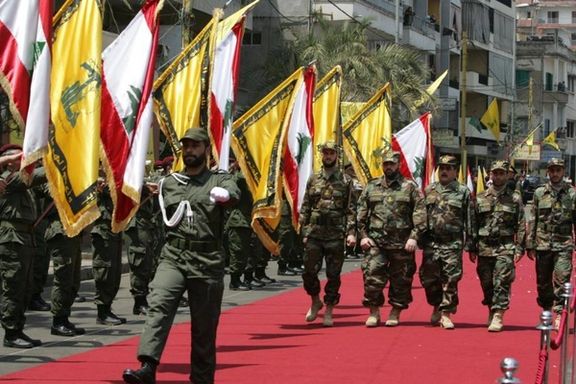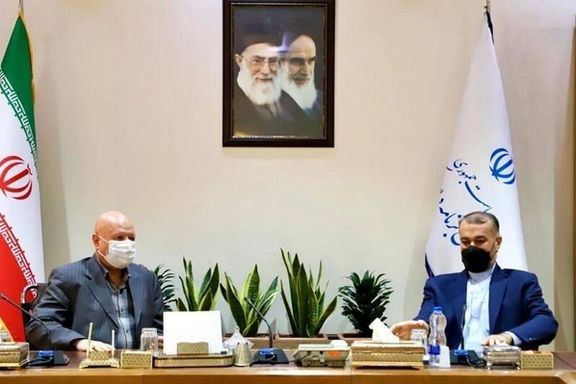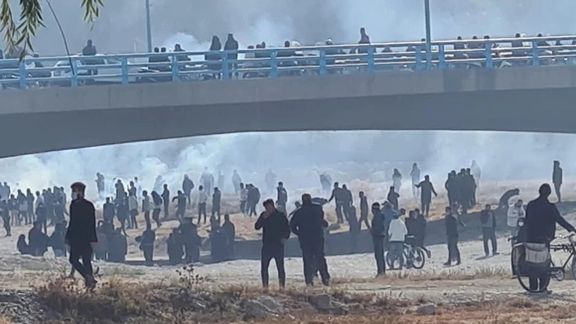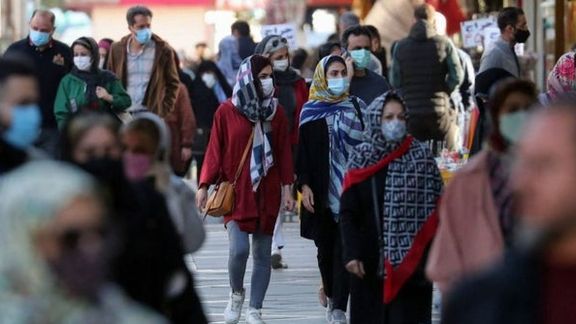MI6 Spy Chief Says China, Russia, Iran Top UK Threat List

China, Russia and Iran pose three of the biggest threats to the UK in a fast-changing, unstable world, the head of Britain's foreign intelligence agency said Tuesday.

China, Russia and Iran pose three of the biggest threats to the UK in a fast-changing, unstable world, the head of Britain's foreign intelligence agency said Tuesday.
MI6 chief Richard Moore said the three countries and international terrorism make up the "big four" security issues confronting Britain's spies.
In his first public speech since becoming head of the Secret Intelligence Service in October 2020, Moore said China was the agency's single greatest priority as Beijing increasingly backs "bold and decisive action" to further its interests.
Moore said Iran also poses a major threat, and uses the political and militant group Hezbollah - "a state within a state" to fuel political turmoil in Lebanon and other neighboring countries.
He argued that Britain's spies must give up some of their deep-rooted secrecy and seek help from technology firms to win a cybersecurity arms race that is giving hostile countries and groups ever more capacity.
Moore said working with the private sector is a "sea change" for an organization enmeshed in secrecy. Until 1992, Britain's government refused to confirm the existence of MI6.
Report by AP

Iran’s capital Tehran on Tuesday registered red air quality alert and ranked as the world’s fourth most polluted city where all population groups are at risk.
The air quality index stood at 162, considered to be “unhealthy” by world standards. This means the degree of the pollution hanging over the city is so high that it is dangerous for all groups, including healthy people.
All ten top-ranking cities on Tuesday were in Asia with two Indian and one Pakistani cities at the top three spots, followed by Tehran.
Mojtaba Khaledi, a spokesman for emergency services, said that due to air pollution calls for assistance have increased by 28 percent.
Iran’s capital and other large cities grapple with pollution most of the year and even occasional rains have a short impact on improving air quality. Most private and public vehicles are old, with three-decade-old technology because of long-running economic problems and government controls.
A new problem added in the past few years is burning of mazut, a heavy diesel fuel, which is banned in most of the world. Iran’s natural gas production is declining, and power plants are forced to use the dirty fuel. The country has the second largest gas reserves in the world, but lack of investment and technology are gradually reducing output.

Iran is planning its next budget on the assumption that US economic sanctions will continue, but is forecasting more than one million barrels p/d oil exports.
In a meeting with Foreign Minister Hossein Amir-Abdollahian the head of Planning and Budget Organization Masoud Mirkazemi expressed hope that US sanctions will be lifted but said the budget is being planned on the assumption that sanctions will remain in place.
Iran’s new budget will go into effect in March 21, 2022 when the new Iranian calendar year starts.
US sanctions imposed in 2018 by former President Donald Trump, who withdrew from the Obama-era nuclear deal with Iran, have crippled normal and legal oil exports, denying Iran roughly 50 percent of its budget income.
The government has resorted to printing money and borrowing that have led to 50 percent annual inflation and a ninefold decline in the value of the national currency compared to 2017.

However, illicit oil exports said to be going mainly to China have increased since September 2020 and provide Iran with an undisclosed amount of revenue. But the nature of the illicit trade would certainly reduce the amount of foreign currencies Iran can receive. Middlemen who facilitate such shipments of oil make hefty profits and Iran must charge much less than global oil prices to entice buyers.
The Iranian Labour News Agency, ILNA reported on Monday that revenues forecast in the budget draft are based on exporting 1.2 million barrels of oil per day. Last year’s budget was also based on the same calculation, but clearly Iran this year has grappled with a 50-percent budget deficit. The reason is that with sanctions in place Tehran was never able to sell that amount of oil with market prices.
President Ebrahim Raisi’s administration needs more income it cannot get from oil exports, yet it has pledged to print less money to control inflation. To deal with this economic quandary, the president on Tuesday ordered his ministers to accelerate the sale of “unwanted government assets”.
Iran’s government is the biggest owner of industrial and financial companies in the country, with their huge assets, after more than four decades of implementing a quasi-state-controlled economic model. But selling assets amid a lack of money in the hands of banks and investors is not an easy or profitable venture. A grim political and economic outlook is another factor inhibiting government efforts to raise money.
Iran is currently engaged in nuclear talks with the world powers that are meant to bring back the United States in to the 2015 nuclear agreement, the JCPOA. This would lift the most damaging sanctions and provide a financial lifeline to Iran. Both foreign and Iranian media and observers are not very optimistic about a quick and positive outcome.

A former revolutionary says Supreme Leader Ali Khamenei is personally responsible for the "the atrocities committed" against peaceful protesters in Esfahan.
In a statement published on the ‘Kalemeh’ Telegram social-media channel Sunday, Abolfazl Ghadiani wrote that “all of the suppressive bodies…and their commanders are responsible for the [attack on] the peaceful, civil and non-violent protest of the people of Esfahan, but the central figure responsible for this aggression and the atrocities committed is Iran's dictator Ali Khamenei who must be held accountable.”
Ghadiani who was a political prisoner both during the monarchy and the Islamic Republic, blames the government for mismanaging water resources and accused security forces of setting fire to the tents of farmers protesting against a lack of water in the dry riverbed of Zayandeh Roud Thursday.
Ghadiani, who was imprisoned on charges of "propaganda against the regime" and "insulting the Supreme Leader" after the disputed 2009 presidential election, said security forces had “wounded a large number of protestors.”
Hasan Karami, a police commander, said Sunday that 2-3,000 "opportunists" had joined Friday's protests and that 67 had been arrested. The United States-based Center for Human Rights in Iran said Monday that at least 214 including 13 children had been arrested in total during the “recent protests.”
Social media users have posted photos of people with shotgun pellet injuries to their backs, legs and faces, including an old man with multiple pellet injuries to his back and a young boy who they claim lost both his eyes.
Iran International TV has obtained radiology images of a protester with tens of pellets embedded in his head, neck, and upper torso.

A medical official told Iranian state television Saturday that 40 people had been treated for eye injuries sustained during the protests, with 19 hospitalized. He did not specify how the injuries were sustained.
Chief Justice Gholam-Hossein Mohseni-Ejei said in a meeting of the judiciary's supreme council Monday that people had a right to look for solutions to their problems but warned them to be wary of the "enemies’ moves" and refuse to allow them to "infiltrate their ranks.”
He suggested that "ignorant people, ill-wishers and agents of foreign powers" had taken advantage of the protests seeking to "disturb people's peace and security."
Brigadier-General Abolfazl Shekarchi, spokesman of the armed forces, said that the “enemy wrongly thinks that the citizens of the Islamic Republic have turned their backs on it, do not want the authorities, and seek regime change."
Kayhan newspaper reported Sunday that "America's foot soldiers" had perverted the water protests to "sow unrest and reap sanctions" ahead of Vienna nuclear talks, which resumed Monday.

Rents in Iran have jumped 47 percent this year in line with general inflation amid sanctions, putting tremendous pressure on millions of people in large cities.
The Central Bank of Iran says people who had to renew leases in the past six months had to accept huge rent increase demands by landlords or move outside big cities, where they could find comparably cheaper housing.
The huge in crease in rents is coupled with more than 60 percent jump in food prices that impacts low-income and salaried workers most. As high double-digit inflation has dogged Iranians since 2018 when the United States imposed sanctions, salaries have not kept pace with the cost of living. In three years, salaries have barely doubled while each year compound inflation has weakened purchasing power.
As an example, if in 2018 an item jumped from 10-15 dollars, in 2019, 50-percent inflation meant that it jumped to $22.5 and in 2020 it rose to $34. Cumulatively persistent annual inflation made the item more than three times more expensive, while salaries rose much slower.
The highest rent increase was in the capital Tehran where it shot up by 50-55 percent this year. Residential prices also rose to about 320,000 million rials for each square meter or about $120 per square foot.
Interestingly while this has also tripled in about three years in local currency, it has remained the same calculated in US dollars, because the local currency keeps losing value. On Monday, the dollar was trading at more than 290,000 rials on the open market, when three years ago it was one-third of that.
Tenants started two signature collection campaigns in August and September asking the government to intervene and control rents, but except lifting of US sanctions and fundamental economic reforms, there is little the government can do.
While Islamic Republic officials claim that Iran has withstood pressure from the United States’ sanctions, in fact it is the people who have endured the brunt of the economic crisis. By some estimates, about 50 percent of Iranians are now considered poor. Many of them were part of the middle class just three years ago.
Consumption of nutritious food such as meat, dairy products and fruits has declined, with wage earners making around 100-150 dollars a month. For foreigners, prices in Iran might seem low, with beef at around $2 a pound, but for a family of three on a $100 monthly income, meat is out of reach, except maybe a limited quantity once every two weeks.
Some former politicians and public figures have warned of serious discontent and possible unrest, cautiously pleading with the country’s leaders to reach agreement with the United States to remove the crippling sanctions, but the ruling hardliners keep promising things will get better and boasting of military and nuclear advances.

An Iranian prosecutor says 124 people have been indicted in absentia for the killing of Iran’s general Qasem Soleimani by US drones in Baghdad, in January 2020.
Saeed Farhadinia, special prosecutor in the international crimes division of Iran’s judiciary told local media on Monday that Soleimani’s case file remains open and is based on several legal principles, including international conventions against terrorism.
He also cited a friendship treaty between Iran and the United States from the 1950s, when Tehran was Washington’s ally. The Trump administration abrogated the agreement in 2018.
Former president Donald Trump ordered Soleimani’s killing citing threat of terror attacks against US forces and interests in the Middle East. Soleimani was Iran’s top military and intelligence operator in the region.
Iran’s Supreme Leader Ali Khamenei and other officials have repeatedly called for revenge for the assassination and Trump has been mentioned as target number one.
Farhadinia said that Iran has no way of bringing the suspects it has identified to trial. Although he did not mention any names, the indicted individuals are assumed to be mostly US and Israeli officials.